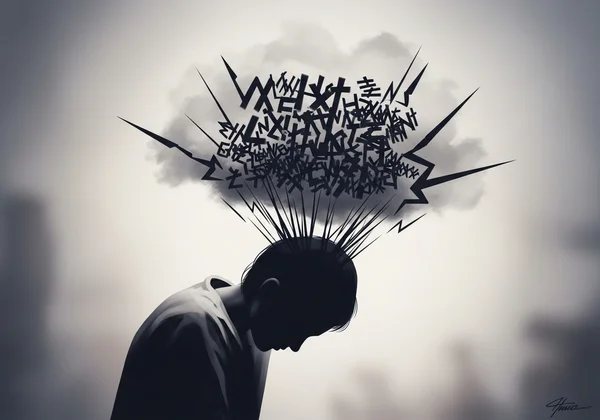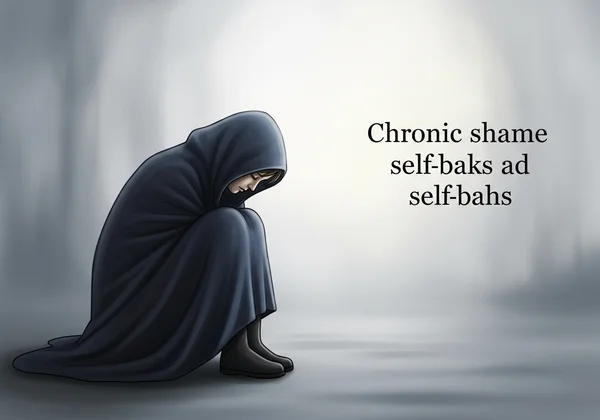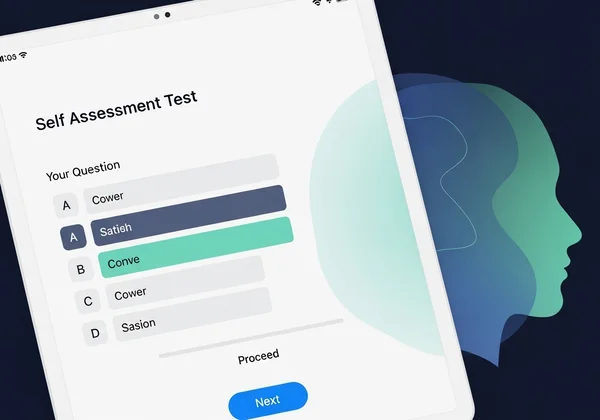CPTSD 검사 및 내면의 비판자: 자기 비난을 길들이고 자기 연민을 기르기
September 7, 2025 | By Beatrice Shaw
끊임없이 자신이 부족하다고 느끼고, 모든 행동을 비난하는 가혹한 내면의 목소리에 시달리고 있나요? 복합 외상 후 스트레스 장애(CPTSD)를 겪는 많은 사람들에게 이 CPTSD 내면의 비판자 는 과거 트라우마에 뿌리를 둔 만연하고 고통스러운 현실이며, 깊은 자기 비난과 수치심으로 이어집니다. 내 내면의 비판자가 CPTSD와 관련이 있는지 어떻게 알 수 있나요? 이 가이드는 비판자의 기원과 영향, 그리고 그 목소리를 잠재우고 자기 연민을 기르는 실용적인 전략을 탐구합니다. 이러한 패턴을 이해하는 것은 큰 힘이 됩니다. 무료 CPTSD 검사를 통해 자신의 경험을 파악하기 시작할 수 있습니다.

CPTSD 내면의 비판자 드러내기: 기원 및 발현
내면의 비판자는 가끔 찾아오는 자기 의심 그 이상입니다. 트라우마 생존자에게는 끊임없이 비난하는 내면의 목소리입니다. 이 목소리는 종종 아동기 학대와 같은 장기적인 트라우마 사건에서 비롯된 비판, 방치 또는 비현실적인 기대를 반영합니다. 그 기원을 이해하는 것이 이를 무력화하는 데 중요합니다.
CPTSD 내면의 비판자는 무엇이며 어디에서 오는가?
어린 시절 안전하지 못한 환경은 아이의 뇌가 생존을 위해 외부 위협을 내면화하게 만들 수 있습니다. 지속적으로 비판적인 보호자의 목소리는 아이 자신의 목소리로 채택될 수 있습니다. 이것은 "내가 먼저 나 자신을 비판하고 완벽해진다면, 나는 처벌을 피하고 안전을 얻을 수 있다"는 잘못된 생존 전략이 됩니다. 이 목소리는 성인이 되어서도 지속되어 CPTSD 내면의 비판자가 되며, 자기 인식을 왜곡하는 해로운 서술자가 됩니다. 이것은 개인적인 실패가 아니라 깊이 뿌리 박힌 트라우마 반응이며, 자기 비판이 통제할 수 없는 상황을 통제하는 유일한 방법처럼 느껴졌던 시기의 심리적 유물입니다. 이러한 기원을 인식하는 것이 당신의 진정한 자아를 그 가혹한 말과 분리하는 데 핵심입니다.
이 가혹한 목소리가 일상생활에서 어떻게 나타나는가
내면의 비판자의 영향은 파괴적이며, 일상적인 생각과 행동에 스며듭니다. 그것은 작은 실수를 치명적인 실패로 확대하여 극심한 자존감 저하를 유발합니다. 일반적인 발현은 다음과 같습니다.
- 완벽주의: 어떤 실수라도 거부나 재앙으로 이어질 것이라고 믿으며, 완벽해지려는 끊임없는 충동.
- 미루는 습관: 완벽하게 해내지 못할 것이라는 두려움이 너무 마비적이어서 아예 시작하는 것을 피하게 됩니다.
- 사회 불안: 다른 사람들이 내 내면의 비판자가 보는 것처럼 나를 부정적으로 볼 것이라고 가정하며, 타인의 판단에 대한 끊임없는 두려움.
- 칭찬을 받아들이기 어려움: 비판자가 가진 '자신은 근본적으로 결함이 있다'는 핵심 신념과 모순되기 때문에 칭찬을 무시합니다.
- 부정적인 자기 대화: "너는 너무 멍청해," "너는 항상 모든 것을 망쳐," 또는 "아무도 너를 사랑할 수 없어"와 같은 가혹한 판단의 끊임없는 자기 비난.
이러한 발현은 트라우마를 강화하는 고통의 순환을 만듭니다. 자신에게서 이러한 패턴을 발견한다면, 비밀스러운 평가를 통해 더 많은 통찰력을 얻는 것이 유효한 경험이 될 수 있습니다.

CPTSD에서 자기 비난에 도전하고 수치심 치유하기
내면의 비판자의 주요 무기는 비난과 수치심입니다. 그것은 트라우마가 당신의 잘못이며 당신이 본질적으로 "나쁘거나" "고장났다"고 설득합니다. 깊이 뿌리 박힌 CPTSD로 인한 자기 비난 에 도전하는 것은 치유의 초석입니다. 이는 당신에게 일어난 일과 당신이 누구인지를 적극적으로 분리하는 것을 포함합니다.
내면화된 수치심과 CPTSD의 순환
병리적 수치심은 죄책감과 다릅니다. 죄책감은 "내가 나쁜 짓을 했다"는 것이고, 수치심은 "나는 나쁘다"는 것입니다. CPTSD를 가진 사람들에게 수치심은 기쁨을 억누르는 만성적인 상태입니다. 내면의 비판자는 부적절함에 대한 인지된 "증거"를 반복 재생함으로써 이 순환을 부채질합니다. 감정적 플래시백 후에는 "봐? 또 과민 반응하고 있잖아"라고 말할 수 있습니다. 이는 결함이 있다는 느낌을 강화하여 위축을 초래하고 비판자에게 더 많은 탄약을 제공합니다. 이 순환을 깨는 것은 수치심을 당신의 가치를 반영하는 것이 아니라 트라우마 증상으로 인식하는 것을 의미합니다.
부정적인 자기 대화에 맞서는 실용 전략
내면의 비판자를 단순히 의지로 없앨 수는 없지만, 그것과의 관계를 바꾸는 법을 배울 수 있습니다. 목표는 그것을 제거하는 것이 아니라 힘을 빼앗고 그 영향력을 줄이는 것입니다.
- 이름을 붙여 길들이기: 내면의 비판자에게 "그렘린"이나 "미스터 반대론자"처럼 다소 우스꽝스러운 이름을 붙여주세요. 이 외부로 분리하는 과정은 심리적 거리를 만들어 그 메시지를 자신의 생각과 분리하여 보게 돕습니다.
- 비판의 진실성 확인하기: 비판자가 공격할 때 잠시 멈추고 묻습니다. "이 생각이 100% 사실인가? 증거는 어디에 있는가?" 종종 그 주장이 오래된 두려움에 기반한 과장이나 노골적인 거짓말임을 발견할 것입니다.
- 3인칭으로 생각하기: "나는 실패자다" 대신 "비판자가 나에게 실패자라고 말하고 있다"고 말해보세요. 이 간단한 관점 전환은 그 목소리가 당신의 정체가 아님을 강화합니다.
- 그 원래의 의도를 인정하기: "나를 보호하려고 노력해줘서 고마워, 하지만 나는 이제 성인이고 이것을 처리할 수 있어"라고 말할 수 있습니다. 이는 그 해로운 메시지를 받아들이지 않으면서 그 기원을 인정하는 것입니다.
자기 연민 함양: 트라우마와 함께하는 내면의 평화로 가는 길
내면의 비판자의 독에 대한 궁극적인 해독제는 자기 연민입니다. 많은 생존자들에게 자신에게 연민을 베푸는 것은 낯설거나 심지어 받을 자격이 없다고 느껴집니다. 그러나 트라우마 치유를 위한 자기 연민 치유 관행을 개발하는 것은 회복의 가장 변혁적인 부분이라고 할 수 있습니다. 그것은 소중한 친구에게 베풀 친절을 자신에게도 베푸는 것입니다.

자기 연민 함양: 자기 연민을 위한 간단한 단계
자기 연민은 비판이 아닌 친절로 동기를 부여합니다. 여기에는 세 가지 핵심 구성 요소가 포함됩니다.
- 자기 연민 대 자기 비판: 특히 고통스러울 때 자신을 부드럽게 보살피는 것.
- 공동의 인간 경험 대 고립: 고통과 불완전함이 공유된 인간 경험의 일부임을 인식하는 것. 당신은 혼자가 아닙니다.
- 마음챙김 대 생각과 감정에 과도하게 몰입하지 않기: 고통스러운 생각과 감정에 사로잡히지 않고 그것들을 관찰하는 것.
작게 시작하세요. 힘든 순간에 가슴에 손을 얹고 "이것은 고통의 순간이다. 나 자신에게 연민을 베풀 수 있기를"이라고 말해보세요. 이 간단한 행동은 고통에 대한 뇌의 반응을 재구성하기 시작할 수 있습니다.
마음챙김과 수용: 내면의 경험과 친구 되기
마음챙김은 판단 없이 현재 순간에 주의를 기울이는 것입니다. 이는 내면의 비판자의 재잘거림에 휩쓸리지 않고, 생각과 감정이 지나가는 것을 알아차리도록 돕습니다. 수용은 비판자에 대한 동의가 아닙니다. 그것은 내면의 전쟁을 끝내는 것입니다. 그 목소리를 과거의 고통의 증상으로 받아들임으로써, 그것은 종종 힘을 잃고 더욱 친절하고 진실된 자아가 발현될 수 있는 공간을 만듭니다. 주요 단계는 증상을 이해하는 것이며, ITQ 기반 검사로 시작할 수 있습니다.
다음 단계: 명확성 확보 및 지원
내면의 비판자를 관리하는 것은 여정입니다. 이러한 기술을 연습하는 동안, 언제 지원을 구하고 자신의 경험에 대한 명확성을 얻어야 하는지 아는 것이 중요합니다.
CPTSD에 대한 전문적인 도움을 언제 구해야 하는가
자기 도움 전략은 강력하지만, 전문적인 지도와 결합될 때 가장 효과적일 때가 많습니다. 내면의 비판자가 일상생활 수행 능력, 관계 또는 안전감에 심각한 영향을 미치고 있다면, 도움을 구할 때입니다. 트라우마에 정통한 치료사는 EMDR(안구 운동 둔감화 및 재처리) 또는 IFS(내면 가족 체계)와 같은 전문적인 치료법을 제공하여 내면의 비판자의 근본 원인을 치유하는 데 도움을 줄 수 있습니다.
자신의 경험을 탐색할 준비가 되셨나요? 무료 CPTSD 검사를 시도해 보세요.
자신의 경험과 증상이 복합 외상 후 스트레스 장애의 프로필과 어떻게 일치하는지 궁금하다면, 구조화된 선별 검사를 받는 것이 놀랍도록 유효한 첫걸음이 될 수 있습니다. 저희의 CPTSD 자가 평가는 세계 보건 기구(WHO)의 ICD-11 지침과 국제 트라우마 설문지(ITQ)를 기반으로 한 무료의 비밀이 보장되는 도구입니다. 안전하고 비판적이지 않은 방식으로 예비 위험 평가를 제공하도록 설계되어, 치유의 길에서 첫걸음을 내딛는 데 필요한 명확성을 제공합니다.

치유 여정을 향한 발걸음 내딛기
CPTSD 내면의 비판자를 잠재우고 자기 연민을 기르는 것은 용기와 자기 발견의 심오한 여정입니다. 그 트라우마적 뿌리를 이해하고 가혹한 메시지에 적극적으로 도전하면서, 당신은 깊은 상처를 치유하고 내면의 공간을 되찾기 시작할 것입니다. 이 경험에서 당신은 혼자가 아니며, 자기 이해를 향한 발걸음을 내딛는 것은 회복력의 강력한 행동임을 기억하세요. 명확성을 얻고 치유의 길에서 다음 단계로 나아갈 준비가 되었다면, 저희의 무료 CPTSD 검사가 당신을 지원하기 위해 여기 있습니다.
면책 조항: 이 기사는 정보 제공 목적으로만 작성되었으며 의료적 조언으로 간주될 수 없습니다. 이 웹사이트에서 제공되는 검사는 선별 도구이며 전문적인 진단을 대체하지 않습니다. 건강 문제에 대해서는 자격을 갖춘 정신 건강 전문가와 상담하십시오.
CPTSD 내면의 비판자에 대한 자주 묻는 질문
내 내면의 비판자가 CPTSD와 관련이 있는지 어떻게 알 수 있나요?
일반적인 내면의 비판자는 성과에 초점을 맞출 수 있지만("더 열심히 했어야 했는데"), CPTSD 내면의 비판자 는 종종 당신의 근본적인 자존감을 공격합니다("나는 망가졌어," "나는 사랑받을 수 없어"). 그 비판은 일반적으로 감정적 플래시백, 수치심, 관계의 어려움과 같은 트라우마 증상과 관련이 있습니다. 자기 비판이 만연하고 잔인하며 과거의 고통스러운 사건과 연결되어 있다고 느낀다면, CPTSD의 증상일 수 있습니다.
강한 CPTSD 내면의 비판자로 인해 일상생활에서 어떤 어려움이 발생하나요?
강한 내면의 비판자는 만성적인 불안, 우울증, 사회적 고립으로 이어질 수 있습니다. 당신이 짐이라고 믿게 만들어 관계를 망치고, 가면 증후군과 실패에 대한 두려움을 부채질하여 경력을 방해할 수 있습니다. 그것은 본질적으로 당신을 지속적인 경계 태세에 가두어 안전하고 편안하며 행복할 자격이 있다고 느끼기 어렵게 만듭니다.
자기 연민이 CPTSD 치유의 첫걸음인가요?
치유에는 여러 "첫걸음"이 있지만, 자기 연민을 기르는 것은 가장 근본적인 것 중 하나입니다. 그것은 CPTSD의 핵심 구성 요소인 수치심과 자기 비난에 직접적으로 맞섭니다. 자신에게 연민을 베푸는 법을 배우는 것은 트라우마 기억을 처리하고 회복력을 구축하는 데 필요한 내면의 안전을 만듭니다. 온라인 선별 검사를 통해 자신의 시작점을 이해하는 것은 이러한 접근 방식을 맞춤화하는 데 도움이 될 수 있습니다.
CPTSD 수치심은 일반적인 수치심과 어떻게 다른가요?
일반적인 수치심은 종종 특정 행동이나 사건과 관련이 있으며 시간이 지남에 따라 사라지는 경향이 있습니다. 그러나 CPTSD 수치심 은 만성적이고 파괴적인 존재 상태입니다. 그것은 당신이 한 어떤 것에 대한 것이 아니라, 당신이 누구라고 믿는 것에 대한 것입니다. 그것은 트라우마 경험의 내면화로 인해 직접적으로 발생하는, 근본적으로 결함이 있고 가치 없다고 느끼는 깊이 뿌리 박힌 감정입니다.